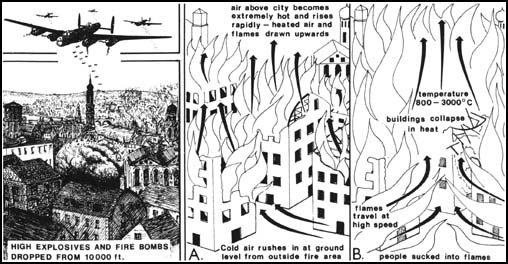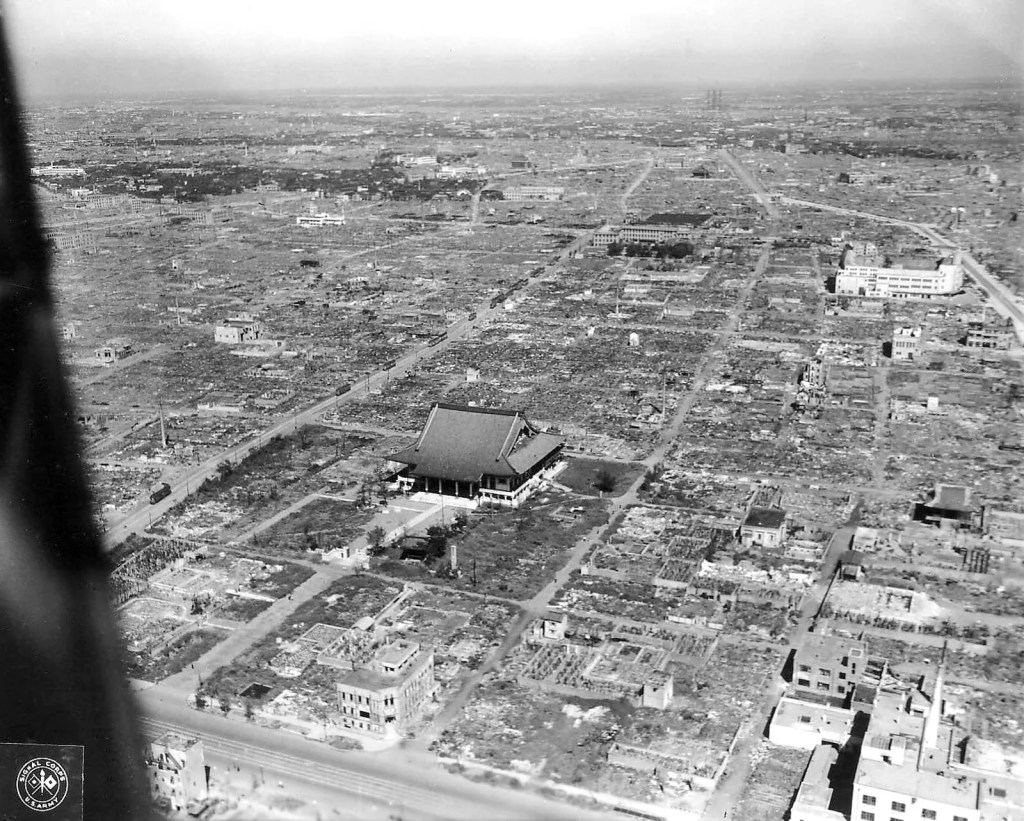The Second World War saw hundreds of thousands of Germans and Japanese civilians slaughtered. The bombing campaigns responsible weren’t decisive and neither Germany or Japan surrendered after devastating raids. Civilian bombing campaigns began as retaliation and escalated into an article of faith. “The inadvertent bombing of London by German aircraft of 24 August [1940] provoked immediate retaliation by Bomber Command against Berlin the following night.”1 (my emphasis) Bombing civilians became an article of faith:-
‘Cities on fire mean we’re successful. We’ve succeeded because that city is on fire.’
Air Marshall ‘Bomber’ Harris led the campaign against German cities with carpet bombing. This meant obliterating zones in cities and the Allies used it routinely. Zonal bombing destroyed everything to ensure strategically important targets were hit.2 Industrial cities were razed to the ground. German resistance continued until the Soviet Red Army entered Berlin showing the tactic was pointless. Winning wars could only be done by armies conquering territory.
The bombing of Hamburg,3 began on 24th July, 1943 and lasted eight days and seven nights. It resulted in 40,000 dead and 900,000 displaced German families. ‘Firestorms’ slaughtered the civilian population. This was the intended consequence after extensive research.4 Harris wanted to burn Hamburg to the ground with its population.

Hamburg took months to re-establish pre-raid productivity. Nearly 200 major factories were destroyed in the bombing along with roughly 4,000 smaller ones. Hamburg would be bombed another 69 times before the end of the war, but it was the initial attacks on the city in 1943 that truly damaged much of Germany’s industrial strength.” (my emphasis)5
The merciless attack on civilians was successful but strategic success wasn’t achieved. Bombing Hamburg demonstrated that Germany couldn’t be defeated solely from the air. The scale of Allied attacks, which continued throughout the remainder of the war, is numbing, “By the end of the war, 305,000 Germans had died because of the bombings, with 1.8 million homes destroyed.”6 That this was a known strategic failure multiplies the horror.
Japan’s experience was like Germany’s until the deployment of ‘A’ bombs. Their resistance also continued despite catastrophic damage and stupendous civilian casualties. The destruction of Hiroshima and Nagasaki is an iconic moment in the Second World War but fewer civilians were killed there than in Tokyo five months earlier.7 The incineration of civilians in Tokyo is a historical footnote, which is a comment on the novelty of the ‘A’ bomb attacks rather than their strategic importance.

The ‘A’ bombs succeeded where carpet bombing failed because they were technologically unknown terror weapons, which hadn’t been normalised by experience. “The night of the firebombing, the family had not sought cover in a shelter, made complacent by the almost-daily frequency of the raids.”8 (my emphasis) This wonderful personal account of the Tokyo bombing illustrates the futility of attempting to win wars from bombing campaigns.
The ‘A’ bombs turbocharged Japan’s surrender because the Americans had total control of the military situation. Japan was faced with the probability that every city would be razed to the ground. Emperor Hirohito’s capitulation speech didn’t acknowledge defeat. Instead, he said, “the war situation has developed not necessarily to Japan’s advantage”.9
The ferocious bombing campaigns of the Second World War didn’t win the war. Civilian morale didn’t collapse and the populations of the bombed nations didn’t rise up in anger against their governments. It’s opaque how far they contributed to ultimate victory. What isn’t opaque is that slaughtering civilians in the expectation of victory is the triumph of hope over experience.
Addendum: Bombing campaigns in 2023
The tit for tat use of drones against civilians in the Russo-Ukraine war is, on this analysis, futile and a distraction from the battlefield.
Likewise, Israel razing Gaza to the ground won’t work unless they copy the 1945 solution and have a military occupation for years.
Notes
1 For an important and very readable account see How Bomber Command Helped Win The Battle Of Britain | Imperial War Museums (iwm.org.uk) For a quick biography of Harris see Arthur Harris – Wikipedia
2 Transport hubs, munition factories, military bases etc. The American broadcaster, Ed Murrow, went on a bombing raid and his report is a brilliant statement of the actuality Edward R Murrow ‘Orchestrated Hell’ | Odeboyz’s Blog (oedeboyz.com)
3 Hamburg July 1943 https://www.spectator.co.uk/2015/05/the-carpet-bombing-of-hamburg-killed-40000-people-it-also-did-good/# There was also a multiple of the dead as injured many suffering from grim burn wounds.
4 Bombing of Hamburg in World War II – Wikipedia The ethics of saturation bombing is discussed here Strategic bombing during World War II – Wikipedia
5 Bombing of Hamburg in World War II Summary & Facts (totallyhistory.com)
6 Did Allied Bombs Destroy German Morale? – JSTOR Daily
7 Bombing of Tokyo (10 March 1945) – Wikipedia
8 The Man Who Won’t Let the World Forget the Firebombing of Tokyo – The New York Times (nytimes.com)

Pingback: The Strategic Context of the Israeli-Gaza War, 7th October 2023 | Odeboyz's Blog